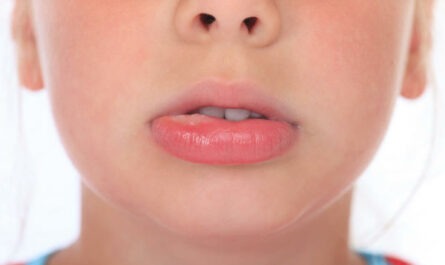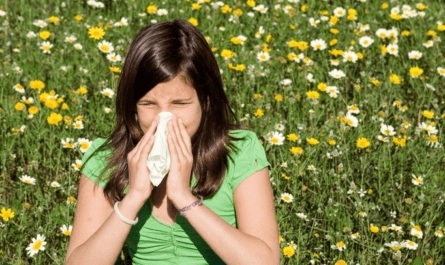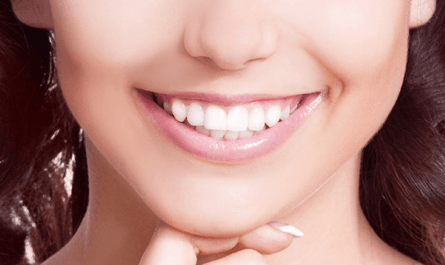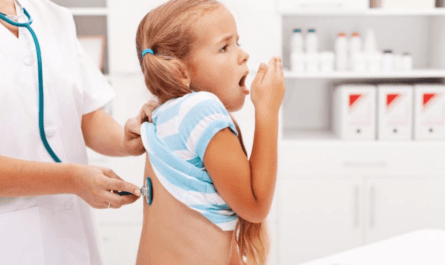Cold sores, also known as fever blisters, are small fluid-filled lesions on or around the lips. They are caused by the herpes simplex virus (HSV-1) and can be both uncomfortable and unsightly. While there is no cure for the virus, several natural remedies can help alleviate symptoms and speed up healing. In this article, we will explore 14 natural remedies that can effectively get rid of a cold sore. Whether you’re looking for immediate relief or long-term management, these remedies are safe, affordable, and easy to implement.
Symptoms of a cold sore
Here are some common stages of this condition.
- Itching: One of the earliest and most common cold sore symptoms is itching on or around the affected area. The itching may be mild to severe and can be accompanied by a burning or tingling feeling.
- Swelling: As the cold sore develops, the affected area may become swollen and tender to the touch. The area may become red and may even feel warm.
- Blistering: A small blister or group of blisters may form on or around the affected area after a few days. These blisters may be filled with clear fluid and may be painful.
- Scabbing: As the blisters dry, they may form a yellowish or grayish scab. The scab may be itchy and crack or bleed if touched or scratched.
- Crusting: After the scab has formed, it may crust over and form a thick layer of dried skin. This crusty layer may be itchy and have a burning or stinging sensation.
- Pain: As the cold sore begins to heal, the affected area may become painful. The pain may range from mild to severe and last several days.
- Fever: Sometimes, a fever may accompany a cold sore. This fever may accompany other cold sore symptoms such as fatigue, headache, and body aches.
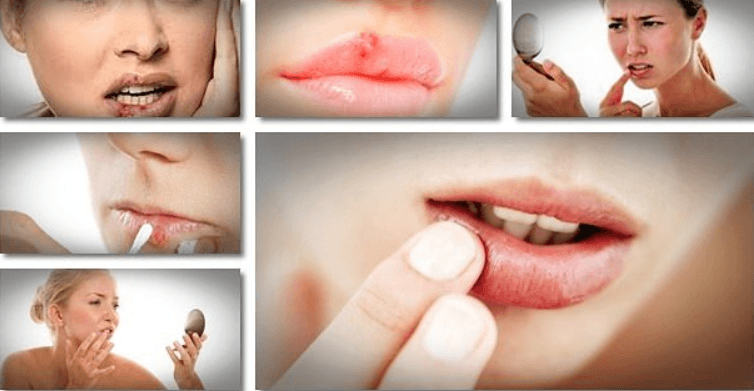
Common Causes of a Cold Sore
1. Herpes Simplex Virus (HSV-1)
Herpes Simplex Virus (HSV–1) is the most common viral cause of cold sores. HSV–1 is a contagious virus that can be spread through direct contact with an infected person.
When contracted, it stays in the body for life and can cause recurrent outbreaks. The virus can be spread through contact with saliva, sharing utensils, kissing, and oral sex. Symptoms of HSV–1 include tingling, itching, burning, and pain around the mouth, followed by blisters lasting up to a week.
2. Sun Exposure
Sun exposure can also contribute to cold sores. Prolonged exposure to the sun’s ultraviolet rays can weaken the body’s immune system and make it easier for the virus to take hold. Additionally, sunburns can irritate the skin and make it more prone to sores.
3. Stress
Stress can also be a factor in cold sores. Too much stress can weaken the immune system and make it harder for the body to fight the virus. Also, stress can cause the body to produce more hormones contributing to cold sores.
4. Hormonal Changes
Hormonal changes can also trigger cold sores. During hormonal flux, such as during pregnancy or menstruation, the body’s pH levels can become unbalanced, making it easier for the virus to take hold.
5. Immune System Suppression
People with weakened immune systems, such as those with HIV or AIDS, may be more prone to cold sores. This is because their bodies cannot fight off the virus. Medications such as chemotherapy or corticosteroids can also suppress the immune system and make it easier for the virus to take hold.
14 Home Remedies to Get Rid of a Cold Sore Fast
Medications are not the only way to go when treating cold sores. There are home remedies for cold sores that do not require medications or prescriptions. Some of them are listed below.
1. Proper Hygiene
Proper hygiene is crucial in preventing the spread and recurrence of cold sores. Cold sores are highly contagious and can be easily transmitted through direct contact. To minimize the risk of spreading the virus, follow these steps:
- Wash your hands frequently with soap and water, especially after touching the cold sore.
- Avoid touching or picking at the sore, as this can worsen the condition and increase the risk of infection.
- Use separate towels, utensils, and personal items to prevent the spread of the virus to others.
- Avoid sharing lip balms, lipsticks, or other products that come into contact with your lips.
2. Ice Therapy
Ice therapy is a simple and effective way to reduce the discomfort associated with cold sores. The cold temperature helps numb the area, reduce inflammation, and provide temporary relief. Here’s how to use ice therapy:
- Wrap an ice cube in a clean cloth or paper towel.
- Gently apply the ice pack to the affected area for about 10-15 minutes.
- Repeat this process several times daily, especially when you experience pain or itching.
3. Lemon Balm
Lemon balm is a herb known for its antiviral properties and soothing effects on the skin. It contains compounds that inhibit the replication of the herpes simplex virus and promote healing. Here’s how to use lemon balm:
- Apply a small amount of lemon balm ointment or cream directly to the cold sore.
- Gently massage the area for a few minutes to help the product absorb into the skin.
- Repeat this process 2-3 times daily until the cold sore heals completely.
4. Tea Tree Oil
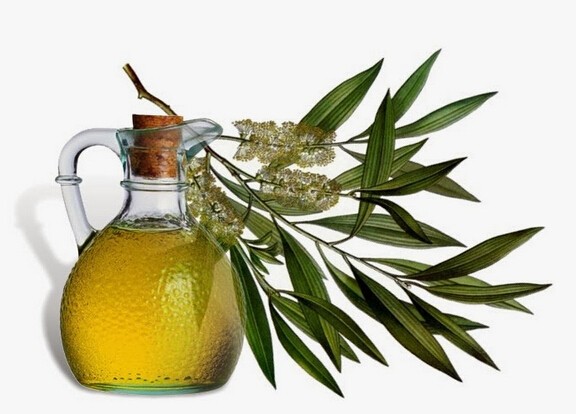
Tea tree oil is a potent natural antiviral and antimicrobial agent that can help combat the herpes simplex virus. It also has soothing properties that can alleviate pain and reduce inflammation. Here’s how to use tea tree oil:
- Dilute tea tree oil with a carrier oil, such as coconut or olive oil, in a 1:3 ratio.
- Using a cotton swab, apply the diluted tea tree oil directly to the cold sore.
- Leave it on for 10-15 minutes, then rinse the area with water.
- Repeat this process 2-3 times a day until the cold sore heals.
5. Aloe Vera
Aloe vera gel is well-known for its healing properties and can relieve the discomfort caused by cold sores. It has anti-inflammatory and soothing effects on the skin. Here’s how to use aloe vera:
- Extract fresh gel from an aloe vera leaf or store-bought aloe vera gel.
- Apply a small amount of gel directly to the cold sore.
- Gently massage the gel into the skin until it is fully absorbed.
- Repeat this process 2-3 times a day until the cold sore disappears.
6. Echinacea
Echinacea is an herb that boosts the immune system and helps the body fight off viral infections, including the herpes simplex virus. It can also reduce the frequency and severity of cold sore outbreaks. Here’s how to use echinacea:
- Brew a cup of echinacea tea according to the instructions on the packaging.
- Allow the tea to cool down to a comfortable temperature.
- Drink the tea 1-2 times a day to strengthen your immune system and prevent cold sore outbreaks.
7. Licorice Root
Licorice root contains a compound called glycyrrhizin, which has potent antiviral and anti-inflammatory properties. It can help reduce the duration and severity of cold sores. Here’s how to use licorice root:
- Crush licorice root to make a fine powder.
- Mix the powder with a small amount of water to create a paste.
- Apply the paste directly to the cold sore and leave it on for 15-20 minutes.
- Rinse the area with water and pat dry.
- Repeat this process 2-3 times daily until the cold sore heals.
8. Peppermint Oil
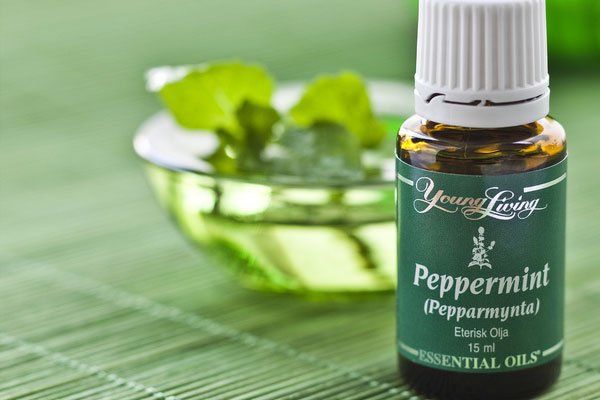
Peppermint oil contains menthol, which has analgesic properties that can relieve pain and discomfort associated with cold sores. Here’s how to use peppermint oil:
- Dilute peppermint oil with a carrier oil, such as coconut or almond, in a 1:3 ratio.
- Apply the diluted peppermint oil to the cold sore using a cotton swab.
- Leave it on for 10-15 minutes, then rinse the area with water.
- Repeat this process 2-3 times daily until the cold sore disappears.
9. Lysine
Lysine is an essential amino acid that helps inhibit the replication of the herpes simplex virus. Increasing your lysine intake can reduce the frequency and severity of cold sore outbreaks. Here’s how to use lysine:
- Consume lysine-rich foods such as meat, fish, dairy products, and legumes.
- Take lysine supplements as directed by your healthcare provider.
- Maintain a balanced diet that includes adequate lysine to support your immune system.
10. Honey
Honey has natural antiviral and antibacterial properties that can help reduce the duration and severity of cold sores. It also helps moisturize the skin and promote faster healing. Here’s how to use honey:
- Apply a small amount of raw honey directly to the cold sore.
- Leave it on for 15-20 minutes, then rinse the area with water.
- Repeat this process 2-3 times daily until the cold sore heals.
11. Zinc Oxide Cream
Zinc oxide cream creates a protective barrier on the cold sore, promoting faster healing and reducing the risk of infection. Here’s how to use zinc oxide cream:
- Clean the cold sore with a mild cleanser and pat it dry.
- Apply a thin layer of zinc oxide cream directly to the cold sore.
- Leave it on for as long as possible and reapply whenever necessary.
- Continue this process until the cold sore disappears.
12. Vitamin E
Vitamin E is an antioxidant that supports skin health and aids in the healing process. Here’s how to use vitamin E oil:
- Pierce a vitamin E capsule and squeeze out the oil.
- Apply a small amount of vitamin E oil directly to the cold sore.
- Gently massage the oil into the skin until it is fully absorbed.
- Repeat this process 2-3 times daily until the cold sore heals.
13. Stress Management
Stress can trigger cold sore outbreaks, so managing stress levels is crucial in preventing recurrences. Here are some stress management techniques:
- Practice relaxation techniques such as deep breathing, meditation, or yoga.
- Engage in regular physical activity, such as walking, jogging, or dancing.
- Get enough sleep and maintain a healthy sleep routine.
- Avoid or minimize stressful situations whenever possible.
14. Healthy Lifestyle
Maintaining a healthy lifestyle is essential for overall well-being and immune system support. Here’s how to adopt a healthy lifestyle:
- Eat a balanced diet of fruits, vegetables, whole grains, and lean proteins.
- Stay hydrated by drinking an adequate amount of water daily.
- Engage in regular exercise to boost your immune system and reduce stress.
- Get enough restful sleep to support your body’s healing process.
How to prevent cold sores from recurring?
You can take several steps to help prevent cold sores from recurring or reduce their frequency. Here are some tips:
- Maintaining good hygiene: Wash your hands regularly, especially before touching your face or applying topical treatments to the affected area. This helps prevent the spread of the virus to other parts of your body or other people.
- Boost your immune system: A strong immune system can help keep the virus in check. Eat a balanced diet rich in fruits, vegetables, and whole grains, exercise regularly, get enough sleep, and manage stress effectively. Consider taking immune-boosting supplements after consulting with a healthcare professional.
- Avoid triggers: Identify and avoid factors that trigger your cold sore outbreaks. Common triggers include exposure to sunlight (sunscreen on your lips and face), stress, fatigue, hormonal changes, and certain foods (such as chocolate, nuts, and citrus fruits). Keeping a diary to track your outbreaks and potential triggers can be helpful.
- Use a lip balm with sun protection: Apply a lip balm or lip sunscreen with a high SPF regularly, especially before sun exposure. Sun exposure can trigger cold sore outbreaks, so protecting your lips from UV rays is essential.
- Don’t share personal items: Avoid sharing items that come into contact with your mouth or face, such as lip balms, utensils, towels, or razors. This reduces the risk of spreading the virus to others or triggering an outbreak on your skin.
- Manage stress: Stress weakens the immune system and can trigger cold sore outbreaks. Find healthy ways to manage stress, such as practicing relaxation techniques (deep breathing, meditation, yoga), regular exercise, getting enough sleep, and pursuing hobbies or activities that bring you joy.
FAQs
1. Are cold sores contagious?
Cold sores are highly contagious, especially when blisters are present. It’s important to avoid direct contact with the sore or any items that may come into contact with it, such as utensils, towels, or lip products.
2. How long do cold sores last?
Cold sores typically last for about 7-10 days. However, the healing time may vary depending on the individual and the outbreak’s severity.
3. Can I still get cold sores even after using these remedies?
Natural remedies can help manage the symptoms and speed up the healing process of cold sores. However, it’s important to note that the herpes simplex virus remains in the body, and outbreaks may still occur occasionally.
4. When should I see a healthcare professional?
If you experience severe or prolonged outbreaks, have a weakened immune system, or if other concerning symptoms accompany the cold sores, it’s advisable to consult with a healthcare professional for appropriate diagnosis and treatment.


